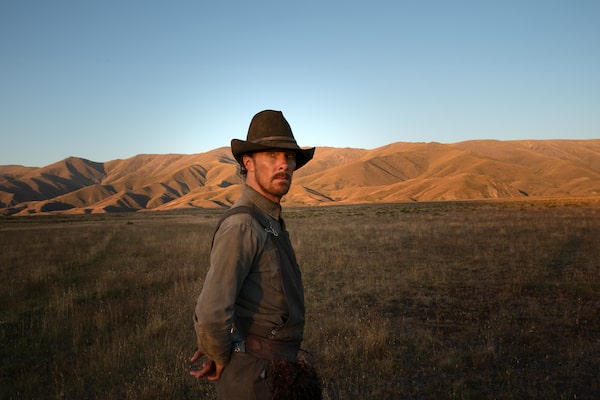
Benedict Cumberbatch plays Phil Burbank in The Power of the Dog.KIRSTY GRIFFIN/Courtesy of Netflix
The Power of the Dog
Written and directed by Jane Campion
Starring Benedict Cumberbatch, Kirsten Dunst and Jesse Plemons
Classification R; 126 minutes
Opens in select theatres Nov. 19; streaming on Netflix starting Dec. 1
Critic’s Pick
It is tempting to speculate that if a man had won a screenwriting Oscar for The Piano in 1994, the world would have heard a lot more from him than The Portrait of A Lady (1996) and Bright Star (2009). Who knows why the brilliant Jane Campion hasn’t written and directed a feature film in more than a decade? Perhaps she’s happier making a successful television series (Top of the Lake). What’s important is that her new film The Power of the Dog returns searingly to the themes of The Piano: Women alone on the frontier; men and their rage.
The Power of the Dog – the title comes from a passage in the Psalms praying for deliverance – is adapted from the 1967 book by Thomas Savage, a master of the western novel and, to judge from this plot, of a devilish tale. On a sprawling ranch in Montana in the 1920s, the wealthy Phil Burbank (Benedict Cumberbatch) commands men and cattle with his fearsome personality. A consummate cowboy with a sadistic streak, he routinely insults his slow-moving brother George (Jesse Plemons) as the siblings mount a cattle drive across the prairie.
The ranchers break the journey in a small town where the widowed innkeeper Rose (Kirsten Dunst) captures the attention of the lonely George. Meanwhile Phil gleefully insults her teenage son Pete (Kodi Smit-McPhee), a sensitive soul who makes paper flowers for the slop-house tables. When George takes the sweet but nervous Rose as his wife and brings her back to the ranch, the stage is set for a psychological showdown as the misogynistic and resentful Phil quietly terrorizes his brother’s new bride.
He’s almost broken her spirit when summer comes and the delicate young Pete arrives to stay: The ranch hands mock the awkward boy with homophobic slurs but Phil is determined to train him in the ways of the West, luring him closer and closer.
There is exquisite dramatic tension here, built partly by Campion’s deft storytelling and partly by her powerful cast. Phil has been formed by Bronco Henry, a late lamented mentor who taught him how to ride and ranch. Remarkably Campion uses no flashbacks to conjure this key character, who died prematurely. Instead she relies entirely on Phil’s fetishization of his memory to tease out the past.
The hard Phil, a classic bully, might seem like a departure for the sensitive Cumberbatch, an actor more often seen in such genteel roles as the title character in The Electrical Life of Louis Wain, the troubled Victorian cat painter who he is also playing this season. Here, Cumberbatch radiates a brittle machismo, producing the crackling energy of the piece while ultimately revealing that this is another of the outcasts and eccentrics he plays so well.
In the face of this male threat, Kirsten Dunst embodies Rose’s fragility and nerves, revealing the way life has overwhelmed a woman placed in the wrong surroundings. Rose is easily spooked but, in truth, Phil is the kind of volatile personality who makes everyone in the vicinity nervous – including the audience. Dunst is our proxy here and her carefully pitched performance charting Rose’s disintegration is key to the film’s suspense.
Meanwhile, George finds it’s best to sorrowfully ignore his nasty brother: In Plemons’ fine characterization, he is wonderfully stolid and occasionally pitiful. The surprise of the piece, and the performances, is that the young Pete will ultimately play Phil’s foil as Smit-McPhee rises provocatively to that expanding role in the film’s unusual third act.
This is gothic, no doubt about it – and that will be some viewers’ and some critics’ complaint. The climax is less visually gruesome than that celebrated moment of gore in The Piano but The Power of the Dog, beautifully shot against the furrowed hills that surround the ranch, is less dependent on heavy symbolism and more psychologically penetrating. In the end Campion has done a magnificent job creating both inevitability and surprise; when the two-edged climax comes it’s powerfully unexpected. You’ll leave the screen with its dastardly implications ringing in your ears.
Plan your screen time with the weekly What to Watch newsletter. Sign up today.
In the interest of consistency across all critics’ reviews, The Globe has eliminated its star-rating system in film and theatre to align with coverage of music, books, visual arts and dance. Instead, works of excellence will be noted with a Critic’s Pick designation across all coverage.
 Kate Taylor
Kate Taylor